In this paper we compare two academic networking platforms, HASTAC and Hypotheses, to show the distinct ways in which they serve specific communities in the Digital Humanities (DH) in different national and disciplinary contexts. After providing background information on both platforms, we apply co-word analysis and topic modeling to show thematic similarities and differences between the two sites, focusing particularly on how they frame DH as a new paradigm in humanities research. We encounter a much higher ratio of posts using humanities-related terms compared to their digital counterparts, suggesting a one-way dependency of digital humanities-related terms on the corresponding unprefixed labels. The results also show that the terms digital archive, digital literacy, and digital pedagogy are relatively independent from the respective unprefixed terms, and that digital publishing, digital libraries, and digital media show considerable cross-pollination between the specialization and the general noun. The topic modeling reproduces these findings and reveals further differences between the two platforms. Our findings also indicate local differences in how the emerging field of DH is conceptualized and show dynamic topical shifts inside these respective contexts.
Editors’ Choice: How Digital Are the Digital Humanities? An Analysis of Two Scholarly Blogging Platforms

